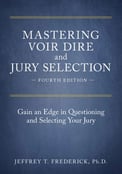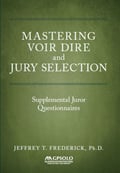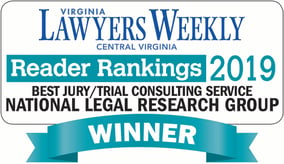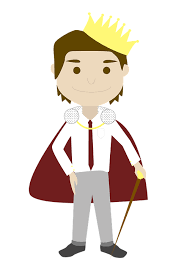February 27, 2018
Jeffrey T. Frederick, Ph.D.
ABA Publishing Announces the Release of Two Books on Jury Selection by Jeffrey T. Frederick, Ph.D.


The American Bar Association’s Solo, Small Firm and General Practice Division announces the publication of two books on jury selection by one of the nation’s most experienced trial consultants. Since Mastering Voir Dire and Jury Selection: Gain an Edge in Questioning and Selecting Your Jury first appeared in 1995, its content has continually evolved, responding to changes in the law, social science research, and developments in jury trials. Its newly revised Fourth Edition includes an extensive discussion of the opportunities and challenges presented by the prevalence of the Internet and social media in jurors’ lives, and the applications of civilian voir dire and jury selection techniques to military courts-martial. The second book, Mastering Voir Dire and Jury Selection: Supplemental Juror Questionnaires, serves as a companion to the Fourth Edition. The book examines how to develop and use supplemental juror questionnaires and provides supplemental questionnaires used in more than 20 significant criminal and civil trials across the nation.
Mastering Voir Dire and Jury Selection: Gain an Edge in Questioning and Selecting Your Jury, Fourth Edition
This much anticipated and expanded fourth edition goes beyond other books on jury selection and focuses on the skills needed to conduct effective voir dire and jury selection, ultimately improving your chances of a favorable verdict at trial. This valuable guide will help you understand effective voir dire and jury selection strategies and adapt them to the unique circumstances you face in your trial jurisdiction.
Read More








